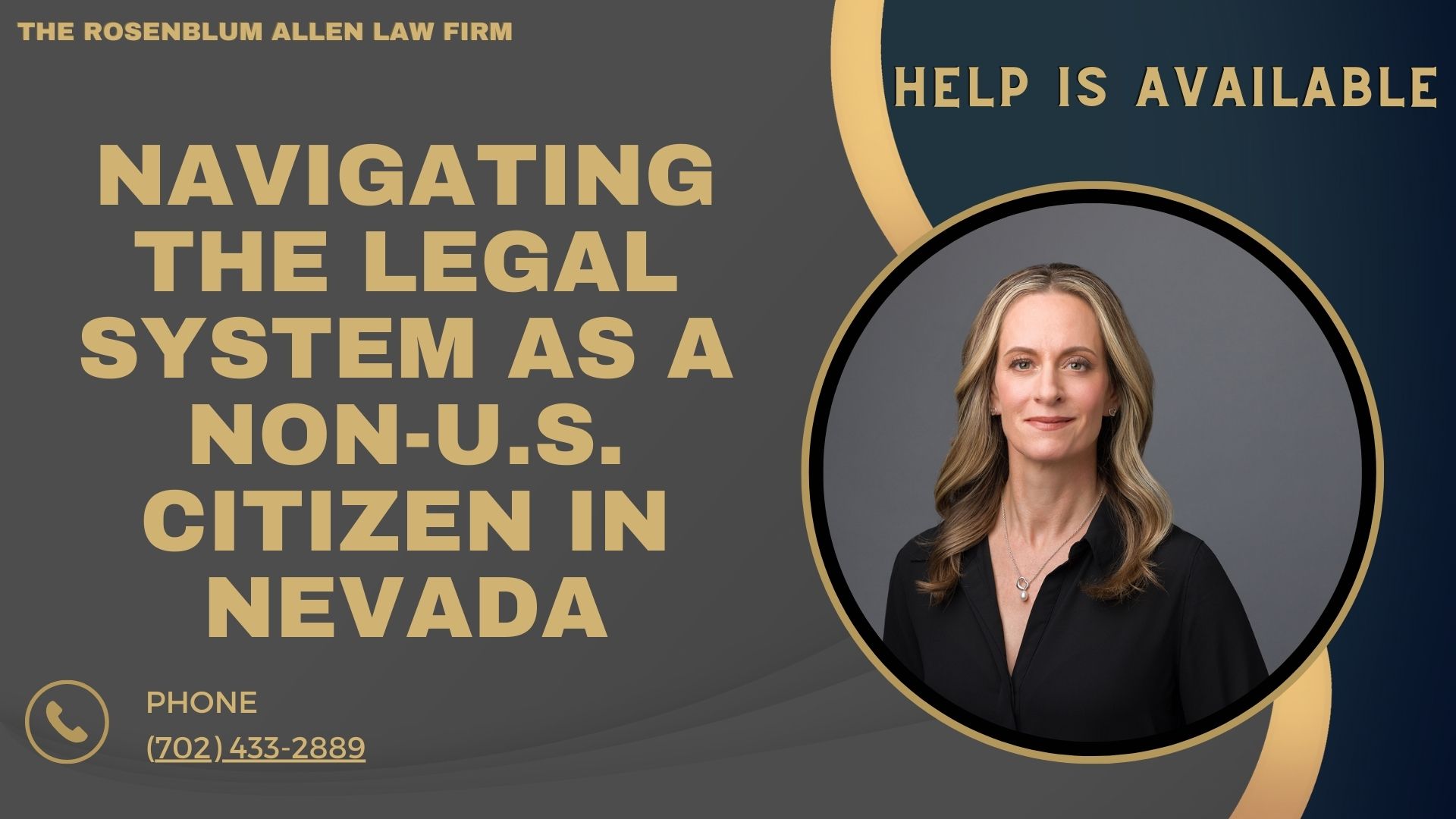Navigating the legal system in Nevada can be challenging, especially if you’re a non-U.S. citizen. Whether you’re dealing with criminal charges, family law issues, or civil disputes, it’s crucial to understand your rights and the legal processes involved. This guide will help you understand everything and provide practical steps to protect yourself.
Understanding Your Rights as a Non-U.S. Citizen in Nevada
Legal Rights of Non-U.S. Citizens in the United States
Non-U.S. citizens have many of the same rights as U.S. citizens, but knowing where the differences lie is essential. Here’s what you should know:
- Right to Due Process: You have the right to a fair legal process. This means the government must respect all legal rights owed to you, from arrest to trial.
- Right to a Fair Trial: You’re entitled to a fair and public trial, regardless of your immigration status.
- Protection Against Unlawful Search and Seizure: Law enforcement must have a warrant or a reasonable cause to search your property.
Understanding these rights can help you navigate legal issues with more confidence.
Common Misconceptions About Non-Citizen Rights
There are several misconceptions about the rights of non-U.S. citizens, which can lead to unnecessary fear or confusion:
- Misconception 1: Non-citizens have no rights if arrested.
- Reality: Non-citizens have the right to remain silent and the right to an attorney.
- Misconception 2: Non-citizens can be deported without a trial.
- Reality: Deportation typically involves legal proceedings where you can present your case.
- Misconception 3: Legal representation is not allowed for non-citizens.
- Reality: You are entitled to legal representation, and it’s crucial to have an attorney who understands criminal and immigration law.
Navigating Criminal Charges as a Non-U.S. Citizen
Criminal charges can be especially daunting for non-U.S. citizens due to the potential impact on their immigration status.
How Criminal Charges Impact Immigration Status
Criminal charges can lead to severe consequences for non-U.S. citizens, including:
- Deportation: Certain convictions can lead to removal from the United States.
- Inadmissibility: Some offenses can make you ineligible to re-enter the U.S. after leaving.
- Loss of Immigration Benefits: Convictions may affect visa applications, green cards, or citizenship applications.
It’s essential to be aware of these risks and work closely with an attorney to navigate the situation.
Importance of Legal Representation
An attorney is crucial, especially one who understands criminal defense and immigration law. They can help you:
- Navigate the complexities of your case.
- Advocate for your rights in court.
- Advise on the immigration consequences of different legal outcomes.
Key Steps to Take if Facing Criminal Charges
- Remain Calm and Know Your Rights: If arrested, you can remain silent and request an attorney.
- Inform Your Attorney About Your Immigration Status: This allows them to tailor their defense to protect your legal status.
- Avoid Plea Deals Without Legal Advice: Some plea deals can have unexpected immigration consequences. Always consult your attorney first.

Dealing with Immigration Authorities
Dealing with immigration authorities can be intimidating, especially when you’re already navigating legal challenges. Understanding your rights and knowing what to do in these situations can make a significant difference.
Understanding the Role of Immigration and Customs Enforcement (ICE)
ICE is responsible for enforcing immigration laws within the United States. It often investigates, arrests, and deports individuals who violate immigration laws.
Key points to remember about ICE:
- ICE can question, detain, and arrest individuals based on their immigration status.
- They operate within specific legal limits, which you should be aware of to protect your rights.
Rights During Interactions with Immigration Authorities
When interacting with ICE or other immigration authorities, you have certain rights. Knowing these can help you stay calm and respond appropriately:
- Right to Remain Silent: You do not have to answer questions about your immigration status or where you were born. Say, “I choose to remain silent.”
- Right to an Attorney: You can speak with an attorney. It’s essential to have a lawyer present during any questioning.
- Right to Refuse Consent to Search: ICE agents need a warrant signed by a judge to search your home. If they don’t have one, you can refuse entry.
What to Do if You Are Detained by ICE
If you find yourself detained by ICE, follow these steps:
- Stay Calm and Silent: Do not give any information beyond your name and date of birth.
- Request an Attorney: Politely insist on speaking with your lawyer before answering any questions.
- Do Not Sign Anything: Without legal advice, do not sign any documents, especially those that may waive your rights or agree to voluntary departure.
- Know Your Immigration Case Number: This can help your family or attorney locate you if you move between facilities.

Navigating Family Law as a Non-U.S. Citizen
Family law matters, such as divorce or child custody, can be stressful, especially for non-U.S. citizens. Understanding how your immigration status interacts with family law can help you make informed decisions.
Divorce and Child Custody Considerations for Non-U.S. Citizens
Navigating divorce and child custody as a non-U.S. citizen involves unique challenges:
- Impact of Immigration Status on Family Law Proceedings: Your status may affect your ability to stay in the U.S. after a divorce, especially if your status is tied to your spouse.
- Custody and Visitation Rights: Courts prioritize the child’s best interests, regardless of the parent’s immigration status. However, issues like deportation risks can complicate custody arrangements.
Protecting Your Parental Rights
It’s crucial to assert and protect your parental rights during legal proceedings:
- Document Your Involvement: Keep records of your involvement in your child’s life, including school activities, healthcare, and other caregiving responsibilities.
- Seek Legal Assistance: A family law attorney with experience in cases involving non-U.S. citizens can help you navigate the unique challenges you may face.
Legal Steps for Non-Citizens in Family Disputes
- Consult a Family Law Attorney: Ensure your lawyer understands family and immigration law.
- File Necessary Paperwork Promptly: Delays can complicate your case and your status.
- Understand How Court Decisions Can Affect Your Status: Some rulings, like orders for spousal support or custody, may impact your legal status or ability to stay in the U.S.
Civil Legal Matters for Non-U.S. Citizens
Non-U.S. citizens can face various civil legal issues, from employment disputes to housing problems. Understanding your rights and knowing how to seek help can be crucial.
Common Civil Legal Issues Faced by Non-Citizens
- Employment Disputes: Issues like unpaid wages, discrimination, or wrongful termination.
- Housing and Tenant Rights: Problems such as eviction, unsafe living conditions, or landlord disputes.
- Access to Public Services: Challenges in accessing healthcare, education, or social services due to immigration status.
Accessing Legal Resources and Support
It’s important to know where to turn for help:
- Legal Aid Organizations: Many provide free or low-cost legal services to non-U.S. citizens.
- Community Groups: Organizations that serve immigrant communities can offer support, resources, and referrals.
Importance of Understanding Legal Obligations and Rights
Being aware of your rights and responsibilities under Nevada law helps you:
- Avoid legal pitfalls that could affect your immigration status.
- Assert your rights in civil matters without fear of retaliation based on your status.

Finding Legal Representation
Finding the proper legal representation is crucial for non-U.S. citizens navigating the Nevada legal system. The right attorney can make a significant difference in the outcome of your case and help protect your rights.
How to Choose the Right Attorney for Non-U.S. Citizens
Choosing an attorney can feel overwhelming, especially when dealing with complex legal issues. Here are some tips to guide you:
- Look for Experience in Both Immigration and Nevada State Law: Not all lawyers are equipped to handle cases that involve both state law and immigration matters. It would help if you had someone who understands the intersection of these fields.
- Check for Good Communication Skills: Your attorney should be someone who listens, explains things clearly, and keeps you informed about your case.
- Consider Cultural Sensitivity and Understanding: An attorney who understands your background and cultural context can be a great asset, especially when dealing with sensitive family or personal issues.
- Ask About Fees and Costs Upfront: Legal fees can add up quickly. Make sure you understand the fee structure and get everything in writing.
Resources for Finding Affordable or Pro Bono Legal Services
Legal representation can be costly, but there are resources available to help non-U.S. citizens find affordable or accessible legal aid:
- Legal Aid Societies: Many organizations offer free or low-cost legal services based on income and specific needs.
- Immigrant Advocacy Groups: Groups like the ACLU, American Immigration Council, and others often provide resources or referrals to trustworthy attorneys.
- Pro Bono Services: Some attorneys offer free services to those in need, especially for cases with significant immigration implications.
- Community Legal Clinics: These clinics often provide free consultations or legal advice on specific days or times. They can be a great starting point to understand your options.

Breaking It All Down
Navigating the legal system as a non-U.S. citizen in Nevada can be daunting, but understanding your rights and where to turn for help can make all the difference. From dealing with criminal charges and family law issues to civil disputes and finding the proper legal representation, being informed is your best defense.
Remember, you don’t have to go through this alone. Resources and professionals are ready to help you every step of the way. Feel free to seek legal advice and support when needed. Your rights matter; with the proper knowledge and guidance, you can navigate the Nevada legal system confidently.

Frequently Asked Questions
Can I still access public services in Nevada as a non-U.S. citizen?
Yes, non-U.S. citizens can access certain public services, but eligibility can vary based on your immigration status. Knowing your specific rights regarding healthcare, education, and other social services is essential. Many community organizations can help guide you through the process.
What should I do if the police in Nevada stop me?
If the police stop you, remain calm and polite. You have the right to remain silent and do not have to answer questions about your immigration status. You should provide your name and, if asked, show a form of identification. It’s also your right to ask if you are free to leave.
Will my immigration status affect my ability to sue someone in Nevada?
No, your immigration status does not prevent you from filing a lawsuit or seeking legal action in civil matters. Non-U.S. citizens can access the courts for employment disputes, personal injury claims, or housing problems.
Can a non-U.S. citizen receive a fair trial in Nevada?
Non-U.S. citizens are entitled to a fair trial in the United States, including Nevada. The Constitution provides everyone, regardless of immigration status, the right to due process and equal protection under the law.
What should I do if I receive a notice to appear in immigration court?
If you receive a notice to appear in immigration court, attending all scheduled hearings is essential. Missing a court date can lead to a deportation order in your absence. Contact an immigration attorney immediately to help you prepare for your case and represent you in court.
Can I apply for a visa or green card if I have a legal case in Nevada?
It depends on your legal case’s nature and current immigration status. Criminal convictions or certain legal disputes can impact your visa or green card eligibility. It’s best to consult with an immigration attorney who can evaluate your specific situation and provide guidance.
What happens if I'm in Nevada on a visa and get divorced?
Divorce can affect your immigration status, mainly if your visa depends on your spouse. You should consult an immigration attorney to explore your options for maintaining your status or applying for a different visa category.
Are there any protections for non-U.S. citizens against discrimination in Nevada?
Non-U.S. citizens are protected against discrimination in employment, housing, and public services. If you feel discriminated against based on your immigration status or national origin, you can file a complaint with the appropriate state or federal agency.
How can I find a lawyer who speaks my language in Nevada?
Many legal aid organizations and community groups can refer you to attorneys who speak your language. Some law firms and attorneys also specialize in serving immigrant communities and offer services in multiple languages.
What can I do if I'm afraid to seek legal help because of my immigration status?
Your right to legal representation is protected, and seeking legal help should not affect your immigration status. Many attorneys offer confidential consultations, and legal aid organizations can provide support without disclosing your information to immigration authorities.

Additional Resources for You from The Rosenblum Allen Law Firm.
In addition to helping with appeals, our lead attorney, Molly Rosenblum Allen, Esq., has created various resources to support you in other legal matters:
Criminal Defense Attorneys: Effective defense for a wide range of criminal charges to protect your rights and future.
Las Vegas DUI Lawyer: Specialized guidance and defense strategies for those facing DUI charges in Las Vegas.
Domestic Violence Lawyer Las Vegas: Compassionate and experienced legal support for domestic violence cases, focusing on protecting your rights.
Drug Possession Lawyer: Aggressive defense for drug possession charges to minimize the impact on your life.
Sex Crimes Attorney: Dedicated representation for sensitive and serious sex crime allegations.
CPS Defense Attorney: Defense against Child Protective Services actions, protecting your family and parental rights.
Misdemeanor Lawyer: Guidance through the legal process for misdemeanors, aiming for the best possible outcomes.
Las Vegas Warrant Defense Attorney: Help with clearing warrants and addressing related legal issues promptly and efficiently.
Las Vegas Probation Violation Attorney: Skilled defense for probation violations to help you avoid harsh penalties.
Theft Crime Defense Lawyer: Representation for theft charges, focusing on reducing charges or dismissing your case.
Kidnapping Lawyers: Effective legal defense for kidnapping charges, prioritizing your rights and freedom.
Juvenile Defense Lawyers: Protecting the rights of minors facing legal challenges, aiming for solutions that support their future.
Firearms Lawyer Las Vegas: Defense for firearm-related charges, ensuring your second amendment rights are upheld.
These resources are designed to provide you with the knowledge and support needed to navigate these challenging legal issues.

Offsite Resources for You
American Bar Association (ABA): https://www.americanbar.org/
The ABA provides extensive resources and information on the legal process, including articles and guides on appeals and other legal topics.
National Association of Criminal Defense Lawyers (NACDL): https://www.nacdl.org/
NACDL offers resources and advocacy for criminal defense attorneys and individuals facing criminal charges, including insights on appeals.
Nevada Judiciary: https://nvcourts.gov/
The official website of the Nevada Judiciary provides direct access to court information, forms, and procedures for appeals and other legal processes.
FindLaw: https://www.findlaw.com/
FindLaw offers a comprehensive collection of legal articles, case law, and guides on various legal topics, including the appeals process.
Justia: https://www.justia.com/
Justia provides free access to a wide range of legal information, including resources related to appeals and Nevada-specific legal issues.
Martindale-Hubbell: https://www.martindale.com/
Martindale-Hubbell offers lawyer directories and legal articles, helping individuals connect with qualified attorneys and learn more about the appeals process.
National Center for State Courts (NCSC): https://www.ncsc.org/
NCSC provides information on court systems, including appeals processes, court administration, and resources for those involved in legal proceedings.

A Special Message from Our Lead Attorney, Molly Rosenblum Allen, Esq

Thank you for taking the time to read through our resources. Navigating legal challenges, especially when you’re far from home, can be overwhelming, but you don’t have to go through it alone. If you need help with your situation or have any questions, please don’t hesitate to reach out. Give me and my team a call at (702) 433-2889, and let’s get the ball rolling. We’re here to support you every step of the way.
Looking forward to speaking with you soon!






